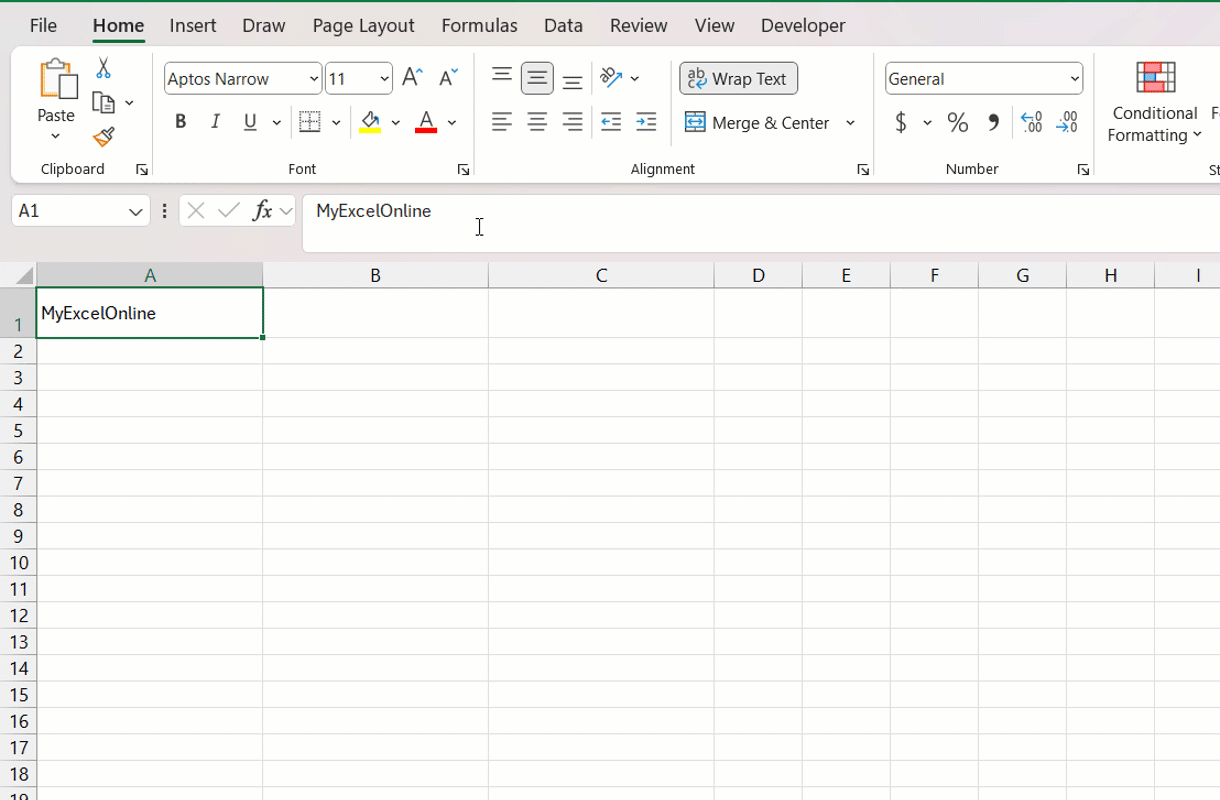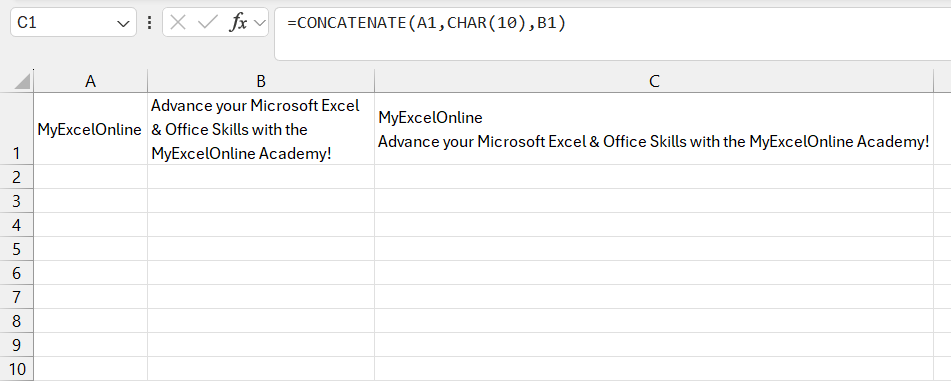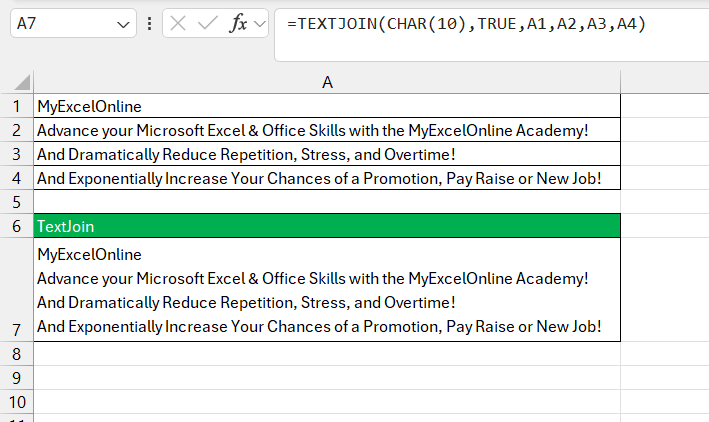Entering a new line within a cell in Excel is a simple yet powerful feature that can enhance the readability and organization of your data. Whether you’re creating structured lists, separating information, or adding notes, knowing how to insert a line break is essential for better data management. This article will guide you through the various methods on how to enter a new line in an Excel cell, ensuring your spreadsheets are both efficient and easy to navigate.
Key Takeaways:
- Efficient Data Presentation: Inserting new lines within a cell improves readability and organization, making complex data easier to interpret.
- Quick Keyboard Shortcuts: Use Alt + Enter on Windows or Control + Option + Enter on Mac to quickly add line breaks without using the mouse.
- Utilizing Formulas: The CHAR function, combined with CONCATENATE or TEXTJOIN, allows automated line breaks within cell content.
- Wrap Text Feature: The Wrap Text feature ensures that all text within a cell is visible and neatly aligned according to column width.
- Troubleshooting: Enable Wrap Text and check cell formatting to resolve issues with displaying new lines, and use CLEAN or TRIM functions to remove hidden characters.
Harnessing Excel’s Cell Potential
The Magic of Multi-Line Cells
Unlocking the full power of Excel cells includes understanding how to insert multiple lines within a single cell. This capability allows me to present data in a more organized and readable form, making it easier to review and interpret complex information.
When a Single Line Just Won’t Do
There are times when a single line in an Excel cell falls short of my needs. Maybe I’m dealing with addresses, lists, or any data that naturally breaks into multiple segments. In these cases, spreading the content over multiple lines within the same cell helps me maintain a tidy, coherent spreadsheet without spilling over into adjacent cells.
How to Enter New Line in Excel
Keyboard Shortcuts: Fast Track to New Lines
Imagine you’re in the zone, data pouring into your spreadsheet, and you hit a snag—how to enter a line break without reaching for the mouse. You’ll be thrilled to know that keyboard shortcuts provide a quick solution. On Windows, pressing Alt + Enter lets you introduce a new line right where you want it.
Mac users fear not; the shortcut for you involves holding Control + Option and then pressing Return or Enter. These shortcuts are the express lane to making your data look crisp—without ever leaving the keyboard.
Formulas: The Power to Break Lines
Let’s talk about automating those line breaks. Excel’s got a formula for that—actually several, but let’s focus on one: the CHAR function. Using CHAR(10) within a formula, you can force a line break at specific points in your cell content.
Let’s say you’re combining multiple cells that need to be separated by a line break; by nesting CHAR(10) in a formula like CONCATENATE or TEXTJOIN, you effortlessly introduce clean, automatic line separation.
Diving Deeper into Excel Techniques
Wrap Text Feature: Showcasing New Lines
It’s time to make your rows and columns dance to your tune with the Wrap Text feature! Think of it as a cozy blanket that snugly fits your text into its Excel cell home. When your sentences look like they’re trying to escape the confines of their cells, Wrap Text steps in to softly nudge the words to line up in an orderly manner, visible and clear.
Just click that Wrap Text button on the Home Tab, and watch as your text neatly aligns itself within the cell, respecting the column width like a text Tetris!
The Concatenate and TextJoin Wonders
Dive into the wonders of Concatenate and TextJoin, two of Excel’s enchanting functions that stitch together pieces of text with the finesse of a master tailor. While Concatenate is like the trusty sewing needle that’s been around for ages, TextJoin is more like the fancy sewing machine—efficient, with a bit more flair, allowing you to include a delimiter such as a line break.
Both get the job done beautifully when you want to weave together cell contents, but TextJoin, with its ability to ignore empty cells, often brings that extra bit of smoothness to your spreadsheet fabric.
Practical Applications & Creative Uses
Organizing Data with Style
Turning your Excel data into a visual masterpiece is part art, part science. By employing multi-line cells strategically, you can transform long, unwieldy strings of text into neatly organized snippets that are both aesthetically pleasing and functional.
Imagine your cells dressed to impress with bullet points, neat lists, or even short paragraphs—all easily scannable and pleasing to the eye. This not only adds a flair of professionalism to your spreadsheets but also enhances readability, making your data effortlessly communicable.
Avoiding Common Pitfalls
Troubleshooting Tips for Stubborn Cells
When you encounter obstinate cells that refuse to display new lines correctly, don’t worry—there’s usually a quick fix. First, ensure that Wrap Text is enabled, as this is a common culprit. If new lines still don’t show up, check the cell’s format; it might be set to a specific type that doesn’t support line breaks.
And if you’re importing data, look out for hidden characters that might interfere with line breaks. A sprinkling of CLEAN or TRIM functions can brush away these unwelcome intruders.
Best Practices to Maintain Cell Integrity
Maintaining cell integrity in Excel is like keeping a diary neat and legible—it requires attention to detail. Stick to a consistent formatting style across your worksheet for a professional look. Uniform fonts, sizes, and alignments in cells with line breaks are a must.
Utilize cell references to make data modification a breeze, picking relative or absolute references as per your project’s dance moves. Don’t forget to plan ahead: Adding rows within a single cell ensures your data retains its charm, even when the spreadsheet evolves into something more complex.
Frequently Asked Questions
Q. How do you press Enter in Excel and stay in the same cell?
To press Enter and stay in the same cell in Excel, first finish typing your content, then simultaneously press Ctrl (Control) and Enter instead of just Enter. This little shortcut confirms the data entry without moving the selection to the next cell.
Q. What is the shortcut for inserting a new line?
The shortcut for inserting a new line in an Excel cell is Alt + Enter on Windows, and Control + Option + Return on a Mac. This allows you to add line breaks within a cell for better organization and readability of your data.
Q. How Can I Paste Multiple Lines into a Single Cell?
To paste multiple lines into one cell in Excel, first copy the text as usual. Then, click on the cell you wish to paste into, double-click it or press F2 to enter the edit mode, and then paste your text. The lines will retain their separation.
Q. How Can I Paste Multiple Lines into a Single Cell in Sheets?
In Google Sheets, to put multiple lines of text in one cell, click on the cell, then press Ctrl + Enter (or Cmd + Enter on a Mac) to create a new line while typing, or double-click the cell and paste pre-separated text directly.
Q. How Can I Split Text into Multiple Lines?
To split text into multiple lines within a single cell in Excel, position the cursor where the split should occur and press Alt + Enter. If you’re parsing long text from one cell into several cells, use the ‘Text to Columns’ wizard under the Data tab.
John Michaloudis is a former accountant and finance analyst at General Electric, a Microsoft MVP since 2020, an Amazon #1 bestselling author of 4 Microsoft Excel books and teacher of Microsoft Excel & Office over at his flagship MyExcelOnline Academy Online Course.











